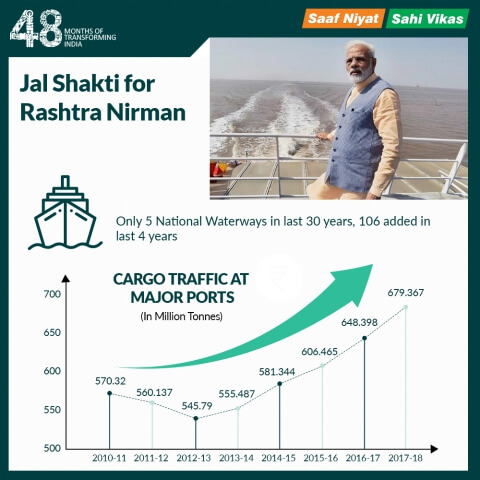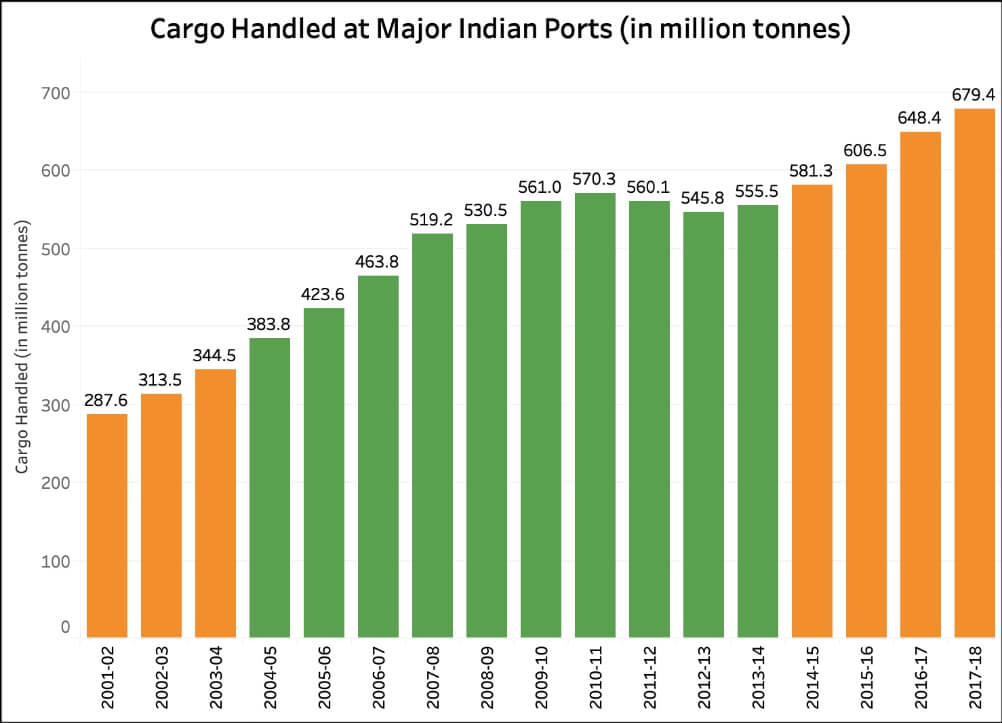[orc]The BJP government published an infographic on the 48-months portal that makes two claims, one about the waterways in India and two about the traffic at major ports. This article is a fact check of these claims.
The BJP government published an infographic on the 48-months portal that makes two claims, one about the waterways in India and two about the traffic at major ports. This article is a fact check of these claims.
How many new waterways were added?
The first claim is that there were only 5 national waterways in last 30 years and that 106 were added in last 4 years.
The National Waterways Act, 2016 was notified in March 2016. The act was passed ‘to make provisions for existing national waterways and to provide for the declaration of certain inland waterways to be national waterways and also to provide for the regulation and development of the said waterways for the purposes of shipping and navigation.’
The National Waterways Bill, 2015 was introduced in Lok Sabha in May 2015. Under Entry 24 of the Union List of the Seventh Schedule of the Constitution, the central government can make laws on shipping and navigation on inland waterways which are classified as national waterways by Parliament by law.
The act passed in 2016 identifies additional 106 waterways as national waterways in addition to the five existing national waterways. The act mentions the 106 new waterways and their limits. The government’s press release of 2016 provides further details regarding the waterways. It has to be noted that the act only designates the national waterways and their development will be taken up in a phased manner. The current status of these national waterways can be seen from the website of the ‘Inland Waterways Authority of India’. It also lists the status of the existing national waterways as well.
Claim: Only 5 National waterways in last 30 years, 106 added in last 4 years.
Fact: The national waterways act of 2016 provides for 106 new waterways over and above the existing 5. Hence, the claim is TRUE. However it has to be noted that the act only designates the national waterways and their development will be taken up in a phased manner.
Did the cargo traffic increase at the major ports?
The second claim is that cargo traffic handled at major ports was 570.32 million tonnes in 2010-11 and it has increased to 679.367 million tonnes in 2017-18.
Data is collated from responses to Lok Sabha question number 3393, question number 322, question number 3062 , Open Government Data Platform , Ministry of Shipping, year book of the Ministry of Statistics & Programme Implementation to understand the volume of cargo handled at major Indian ports. From the data, it is clear that the cargo handled increased from 344.54 million tonnes in 2003-04 to 530.54 million tonnes in 2008-09 during the UPA-1, an increase of 54%. During the UPA-2, it increased from 530.54 million tonnes in 2008-09 to 555.49 million tonnes in 2013-14, an increase of only 5%. During the current government, it increased from 555.49 million tonnes in 2013-14 to 679.37 million tonnes in 2017-18, an increase of 22%. The amount of cargo handled has steadily increased since 2001-02 except for a dip in the years between 2011-14.
The amount of cargo handled has steadily increased since 2001-02 except for a dip in the years between 2011-14.
Claim: Cargo traffic at major ports was 570.32 million tonnes in 2010-11 and it has increased to 679.367 million tonnes in 2017-18
Fact: Cargo traffic at major ports was 570.09 million tonnes in 2010-11 and 679.36 in 2017-18. Hence, the claim is TRUE. However, the amount of cargo handled has steadily increased since 2001-02 except for a dip in the years between 2011-14. During the UPA-1, the cargo handled increased by 54% compared to 5% during the UPA-2 and 22% during the current government.
This story is part of a larger series on the 4-years of the Modi government. This series has been made possible with the flash grant of the International Fact Checking Network (IFCN). Read the rest of the stories in this series here


